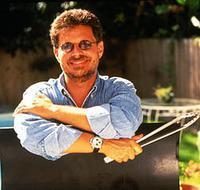Three quarters of a million years ago or so, the world witnessed a revolution. Man became the first animal to cook. The mastery of fire by homo erectus around 700,000 B.C. had a profound effect on human evolution. The massive jaw and oversized teeth used by earlier hominids to chew raw meat (a task requiring five to six hours a day) gradually shrank, allowing for an expansion of the cranium (seat of the brain) and the tongue (instrument of speech). Thus, roasting meat over a fire led to language, advanced tool-making, abstract reasoning, complex social organization and even religion and art. You could say that barbecue begat civilization. And you thought the reason people are so passionate about barbecue had solely to do with taste!
Of course, flavor is an important reason for the near universal popularity of live-fire cooking. The high, dry heat of the grill caramelizes animal proteins and plant sugars, producing crustier, meatier steaks and sweeter, more succulent vegetables. The heady scent of wood smoke adds complex layers of flavor to pork shoulders, ribs and briskets. But taste is only part of why barbecuing and grilling have so captured our collective imagination. For many grill masters, barbecue is a performance art a chance to show off your cooking skills amid leaping flames and sizzling meats. For others, it strengthens our social fabric. I can't remember the last time people gathered around an oven to drink a beer and watch a cake bake but people always congregate at the grill.
One thing is certain: The popularity of grilling is skyrocketing whether you practice this ancient art on a $10 hibachi on your fire escape, a $100 smoker in a parking lot or a $10,000 stainless steel gas supergrill in a custom-built outdoor kitchen. According to the Barbecue Industry Association, more than 80 percent of American families own grills and more than 60 percent grill year-round. Last year, Americans lit their grills more than 3 billion times. One of the hottest new trends in barbecue is multiple grill ownership using a gas grill for weeknight grilling convenience and a charcoal grill for smoking and barbecuing on the weekend. So what are the five most important things to remember when grilling this summer?
1. Don't confuse barbecuing and grilling. The first means slowly cooking foods next to or over low heat in fragrant clouds of wood smoke. The second means searing food quickly and directly over a hot fire. Tough, fatty foods like briskets and ribs are barbecued; tender foods, like steaks, chops, fish fillets and most vegetables are grilled.
2. Create a safety zone. Leave part of your grill unlit and part of the grate without food. That way, if you get flare-ups or your food starts to burn, you have a safe place to move it.
3. Turn, don't stab. Use tongs, not a barbecue fork, for turning meat. The latter pierces the meat, draining the juices.
4. Give it a rest. Steaks and chops will be juicier if you let them sit for a few minutes after grilling before serving.
5. Don't desert your post. Grilling is an interactive sport; once you start, don't leave the grill until you're finished.
Steven Raichlen is the author of The Barbecue Bible, How to Grill and the new Raichlen on Ribs, Ribs, Outrageous Ribs and the host of Barbecue University on public television. His website is barbecuebible.com.








